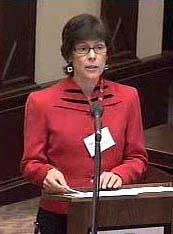In his State of the Union speech, President Obama stressed the importance of high-speed Internet access for all, pointing out that America's top engineers give our current broadband infrastructure a miserable D grade.
To compete internationally, Obama said, we need to have both a strong national network and a technologically trained workforce.
 www.broadbandmap.gov www.broadbandmap.gov |
"Within the next five years, we'll make it possible for businesses to deploy the next generation of high-speed wireless coverage to 98 percent of all Americans," he promised. "This isn't just about faster Internet or fewer dropped calls. It's about connecting every part of America to the digital age. It's about a rural community in Iowa or Alabama where farmers and small business owners will be able to sell their products all over the world. It's about a firefighter who can download the design of a burning building onto a handheld device; a student who can take classes with a digital textbook; or a patient who can have face-to-face video chats with her doctor."
Being wired for speedy Internet access is crucial for the U.S. national economy and for our state and local economy. But 100 million Americans still don't have access to broadband connections at home.
So last year, the FCC laid out a national broadband strategy that includes major investments in broadband and urges government at all levels to push for robust competition.
Portland Launches Broadband Planning Effort
 Commissioner Dan Saltzman, Portland City Council, Commissioner Dan Saltzman, Portland City Council,with broadband executives |
That's why the City of Portland launched a new Broadband Strategic Planning effort Jan. 28, which seeks to deliver affordable high-speed Internet to every home and business in the city.
Joanne Hovis, president of Columbia Telecommunications Corp., a public interest, communications engineering and consulting firm, spoke to the Broadband Strategic Planning group from her office in Maryland, using Skype video conferencing.
"Providing this utility and planning to meet the community need is a core government function," Hovis said. "What I see are significant national efforts in our competitor nations, particularly in Asia, but also in Europe, to deploy next generation technologies…"
The United States is lagging behind, she said. China has more fiber to home connections than the USA, for example, while in New Zealand 90 percent of homes and businesses already are wired for high speed Internet. France, England, Japan, Australia and many other countries also have forged ahead with national, government-led plans.
"We must remember that we are educating our children for jobs that don't yet exist, to use technologies that haven't yet been invented to solve problems that we don't yet know are problems," she said.
"If we don't have the technologies and the platform to do this, we are putting ourselves and our children at a terrible disadvantage."
Can Competition Deliver Affordable High-Speed Internet?
Portland several years ago took up a full broadband effort which collapsed due to the economy, but not before installing mile upon mile of fiber-optic cable that runs under city streets. These cables constitute the infrastructure needed to deliver high-speed Internet.
Wireless connections can't work alone; they need to be backed up by these powerful fiber cables. Having them already in place is an advantage that rural Oregon and Washington and many other communities across the country simply do not have.
The commercial telecommunications companies that control our high speed Internet access have had little
 Mary Beth Henry, Office of Cable Communications, Mary Beth Henry, Office of Cable Communications,City of Portland |
motivation to expand their services to rural areas or high poverty urban neighborhoods. Currently 15 percent of Portland residents don't have a choice of Internet provider.
"The first goal I have in this planning process is what we can do to create competition," said Mary Beth Henry, second in command at the City of Portland's Office of Cable Communications and Franchise Management. "Without competition you don't have a market and you don't have choice."
Perhaps one of the most intriguing ideas is that universal broadband could save government, business and private citizens a lot of money. How?
"What if we had robust, affordable broadband, so everyone could telecommute one day a week," Henry suggests. "You wouldn't have to build so many roads. You would put less stress on TriMet. We could reduce carbon emissions and make progress toward our sustainability goals."
Hovis said one study looked at how telecommuting like this would affect Seattle. It found that noxious gas and emissions would be reduced by 595,000 kg a year.
And the National Broadband Plan estimates that using the Internet for health checks and record keeping will save us $700 billion over 15 – 25 years.
NW Region Seeks to Expand High-Speed Internet: Part 2.












































































































































































































































































































